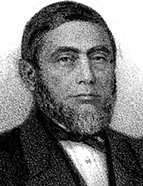

João Francisco Lisboa was born in Pirapemas, Maranhão, in 1812, the son of João Francisco de Melo Lisboa and Gerardes Rita Gonçalves Nina. Coming from a traditional but impoverished family, João Francisco Lisboa began his studies in São Luís, the capital of Maranhão, where he lived until the age of eleven. After a brief return to Pirapemas, he was sent back to São Luís following the death of his father, when he was fourteen years old. During this time, although he was largely self-taught, he frequented some renowned scholars, including the Latin teacher, philologist, critic and journalist Francisco Sotero dos Reis (1800-1871), whom he would later become an intellectual and political dissident.
As a member of the liberal group, Lisboa worked in the press from the age of 20, editing newspapers such as O Brasileiro, Farol Maranhense, Ecos do Norte and Cronica Maranhense. Thanks to this work, he gained prominence in the Liberal Party and was elected to the Provincial Assembly between 1834 and 1837 and 1838 and 1841, during which time he also held the position of secretary of the government (1835-1838). In 1840, amid political upheaval caused by the resignation of Feijó and the Balaiada revolt (1837), with which he was accused of having ties, Lisboa faced political ostracism and disillusionment with political parties. This distancing from party politics was expressed in his scathing criticisms published from 1852 onwards in the Jornal de Timon, one of his best-known publications, which appeared in twelve volumes, the last two of which were published in Portugal.
In 1855, João Francisco Lisboa travelled to Rio de Janeiro, where he stayed briefly before leaving for Lisbon on a mission to collect documents relating to the history of Brazil from the Portuguese archives. In Portugal, while frequenting the Torre do Tombo and the archives of the Overseas Council, Lisboa came into contact with Portuguese scholars and historians, including Alexandre Herculano. It was during this period that he honed the skills that, at that time, were considered characteristic of modern disciplinary historiography and would later place him in the pantheon of Brazilian historiography. This late work is expressed both in the two final volumes of Jornal de Timon and in his unfinished biography of Father Antônio Vieira. After his death, his friend Antonio Henriques Leal took on the task of editing his Obras Completas (1864-1865) in three volumes, which would broaden the reception of Francisco Lisboa’s work in Brazilian literary circles.
This work is financed by national funds through FCT - Foundation for Science and Technology, I.P, in the scope of the projects UIDB/04311/2020 and UIDP/04311/2020.
